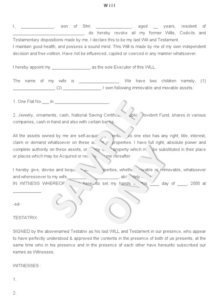Will
Will is a Legal Document which has details of how the person writing it wishes to distribute his/her wealth and assets among the heirs. It is an essential part of financial planning as it is an efficient method of distributing your wealth and assets among your family members and ensuring that each one’s needs are taken care of. The Will becomes valid only after the death of the person writing it, i.e. the testator. Means validity of a will becomes enforceable only after the death of the testator. It gives absolutely no rights to the legatee (the person who inherits) until the death of the testator.
Deed of Will
Deed of Will is a legal declaration of the intention of a testator with respect to his property, which he desires to be carried into effect after his death. It includes codicil and every writing making a voluntary posthumous disposition of property.
Rules / Conditions for a Legal Will (Section 63 of the Indian Succession Act, 1925)
The testator should sign or affix his mark (e.g., thumb mark)
The Will must be attested by 2 or more witnesses
The witnesses must have seen the testator sign or affix his mark to the Will
Each witness shall sign the Will in the presence of the testator.
The witness should not be a beneficiary under the Will.
Types Of Wills
- Privileged Wills
- Unprivileged Wills
- Conditional Wills
- Contingent Wills
- Joint Wills
- Mutual Wills
- Duplicate Wills
- Holograph Wills
- Concurrent Wills
- Sham Wills

Privileged Wills: A Privileged Will is an informal will which remains valid even though it does not fulfil the usual legal requirements. Privileged Wills are governed under Section 65 of the Indian Succession Act, 1925.
Unprivileged Wills: Unprivileged wills are the wills that can be created by every person other than those who can create a privileged will. Unprivileged Wills are governed under section 63 of the Act.
Conditional Wills / Contingent Wills: Execution of these wills are dependent on happening of an event and if that event occurs in the future only then the will is to become effective. These wills are created for multiple purposes. If the testator wants to motivate a loved one for doing something good, like ‘my son will get my property only if he graduates from his law school with a 70% score’ or want to make safe appropriations of his property in case of his death while touring abroad6, he can make a contingency regarding the same in his will. Any condition which is contrary to the law or is invalid in nature cannot be incorporated in a will.
Joint Will: When two or more people agree to make a conjoint will, such testamentary documents are known as Joint Wills. These are generally created between married couples, with an intention to leave the property to their spouse after one of them dies. A joint will can also be created with an intention to take effect after the death of all the testators.
Mutual wills: These wills are the kind of wills in which two people agree to formulate a will on the mutually agreed terms and conditions. Mutual Will helps to ensure that the property passes on to the children of the deceased and not a new spouse of the surviving partner in case they remarry.
Duplicate Wills: If there are two copies of a will, then those wills are called Duplicate Wills. There are two copies of the will although it is considered as a single will. It is very simple to create a duplicate of the will. The testator has to make a second copy of the will and shall sign it and get it attested in the way that he did for the original will as per Section 63 of the Indian Succession Act, 1925. One copy can be kept with the testator and the other might be kept in safe custody somewhere like in a bank locker, with a trustee, the drafting attorney or with the executor.
Holograph Wills: Wills which are handwritten by the testator himself are known as Holographic Wills. These kinds of will have their own merit. Due to the fact that they are completely handwritten by the testator himself, raises a strong presumption pertaining to their regularity and execution.
Concurrent Wills: Typically, a testator prepares a single will for his/her testamentary declarations. The testator according to his wish or for the sake of convenience can make different wills for the property located in different geographical locations. Hence, co-existing wills, dealing with testamentary declarations of a single testator are known as Concurrent Wills.
Sham Wills: These wills are created for an ulterior motive which is not the testamentary operation and execution of the will. Rather in most cases, these wills are created for an immoral purpose like acquiring a property that does not belong to the claimant, deceiving someone etc. These wills are supplemented with all the necessary documents to duly execute the collateral purpose and not to execute the will according to the testamentary operations.
How to draft a Will?
Important Points while executing a Will
Keep the following points in mind when you write your Will:
Start with a self-declaration, stating your name, address, age at the time of writing and that you are in your complete senses and writing without any coercion or pressure from any family members, lawyers, friends or acquaintances.
Give as many details of your assets as possible. The value of your liquid assets (stocks, bonds, mutual fund units, bank accounts, and cash) may change over time. Hence, instead of mentioning them, it might be wiser to broadly categorize them and note their value at the time of writing.
For physical assets like jewelry or artefacts, and immovable assets such as property, be sure to mention as many details as possible. Store the documentation related to your assets in a secure location (like a bank locker) and specify that location in your Will.
Once you have made a list of all your assets, clearly state which of these you want to bequeath to whom and in what quantity or percentage. Ensure that you mention the full names (as they appear in their passports or Aadhaar cards) of your heirs and your relationship with them. If any of the heirs is a minor, you will have to appoint someone as a custodian till the heir attains majority.
If the document you are preparing is complex (several bequeaths to different people and/or organizations), it is a good idea to appoint an executor, who will have the legal responsibility and authority to carry out your wishes. The executor could be a close friend or someone you trust such as your lawyer or accountant, etc. Today, there are professional agencies that will help you draft a Will and execute it for a fee. You could consider one of them.
You will need two independent witnesses (people not named as beneficiaries or executors) to sign every page of the Will. The date and place/venue should also be written at the bottom.
While a Will written on a plain paper remains valid provided you have followed the above steps, to make it stronger, you could consider registering it the local sub-registrar’s office. A Will does not attract stamp duties, but you will have to pay registration fees.
The signed (and hopefully registered) Will should be put into an envelope. Seal the envelope write the date and sign it across the flap, so that if someone tries to open it such attempt at tampering becomes evident. While it is not legally necessary, you can even ask the witnesses to sign the envelope. If the Will is not registered your signature is the only piece of evidence that can help ascertain its authenticity. Hence, pay attention while signing your Will.
Make one or more copies of your Will and store them separately from the original. You could keep one copy with the executor.
You can change your Will anytime you want, but only the last one is considered legally valid. To be doubly sure, in case you do change, declare at the start of the new Will that this supersedes all pervious ones. This may help in preventing confusion and conflicts in the future.
In the absence of a Will. Your assets will be distributed among your heirs as per the Succession Laws pertaining to your religion.

** It is better to have guidelines to prepare a will for any reason, without any lawyer or an advocate or an attorney it may leads into loopholes.
If you are looking to Drafting a Will, Transfer of a Will, Deed of Will OR any other types of will.




